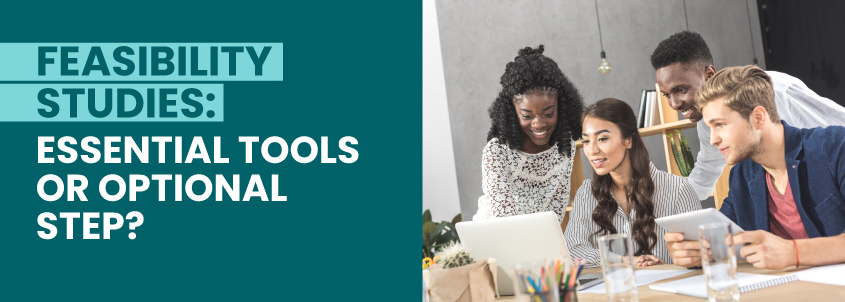Feasibility Studies: Essential Tools or Optional Step?
If you are planning a capital campaign and you know that by hook or by crook the project that you are raising money for through your campaign is going to happen, you may wonder why you would test your plan with a feasibility study.
Whatever the results of the study, you’re going to go ahead because you must. Perhaps your lease is up and you need a new facility by a certain date. Perhaps you have a generous donor who has offered a big gift if you raise a matching amount. Perhaps your programs have outgrown your facilities so badly that the numbers of people waiting for service are embarrassing and the need is critical!
All those situations would pressure you into a campaign for new or expanded facilities. And one way or another, you’re going to make the fundraising campaign and the project happen.
So much for testing feasibility!
But in fact, most so-called “feasibility studies” are really planning studies that help determine not whether to move forward but how to move forward.
Done well, they accomplish a great deal to get your campaign off to a strong start.
Why Feasibility Studies Matter For Capital Campaigns
Here are four important reasons that a feasibility study is an important part of your campaign.
- A feasibility study tests a specific plan. Preparing for a study requires careful and disciplined work to develop and describe what you are raising money for, why it matters and how much it will cost. This early step of preparing for a study often pushes an organization’s staff to complete essential work early so it can be tested in the study.
- A feasibility study prepares and engages your largest donors. A feasibility study invites the largest donors and the organization’s leaders to have probing and meaningful conversations about the project plans while they are still in their early development stage. This process draws potential donors and leaders into the planning process.
- A feasibility study provides early indications of funding potential for the project. Many projects are funded through multiple sources. For example, you might combine funds raised through a campaign with a loan and money from your cash reserves. A feasibility study will help you make an early determination of how much you are likely to raise for the project through your capital. Then you can determine how much you will need from other sources.
- A feasibility study builds board confidence. Board members facing a big project and a capital campaign are likely to be anxious. They know that if the campaign is not successful, they will be left with a big problem. A feasibility study will help reassure the board by providing fact-based evidence about the likelihood of successfully raising a specific amount for the proposed project.
In addition to these reasons, new research from Capital Campaign Pro shows that feasibility studies make a positive impact on campaigns.
According to the study, of nonprofit organizations that conducted a feasibility study before their campaign, 94% strengthened major donor relationships (as opposed to 66% for organizations that did not conduct a study), and they also raised 115% of their campaign goal (as opposed to 101% for organizations that did not conduct a study).
Clearly, feasibility studies work in your favor!
The Feasibility Study is an Early Phase of Your Campaign
Think of it this way. A feasibility study is not an optional nice-to-have, but rather it is one of the important phases of your campaign. If you are planning a capital campaign, start your campaign with a well-done feasibility study. It will set you up for success.
To make it more palatable for your board and executive staff, you might call it a “Campaign Planning Study.” Make it clear that any effort to raise the large goal of a campaign without effective planning is a fool’s errand.
How to Conduct a Feasibility Study
You will have choices to make about the best way to conduct a study.
In the traditional mode, you will engage a capital campaign consultant to prepare the study and conduct the interviews.
Your other option is a newer approach, which involves having campaign experts help design the study and train key leaders of the organization to conduct the interviews.
However you decide to conduct your feasibility study, remember to remain open minded when you receive the results. This will prepare you to take important next steps that will get you closer to your capital campaign goal.
Whether your capital campaign is going to be a major undertaking or a mini campaign, testing the feasibility of your plan will be essential to success. Make sure to bake a feasibility study into your planning process!
